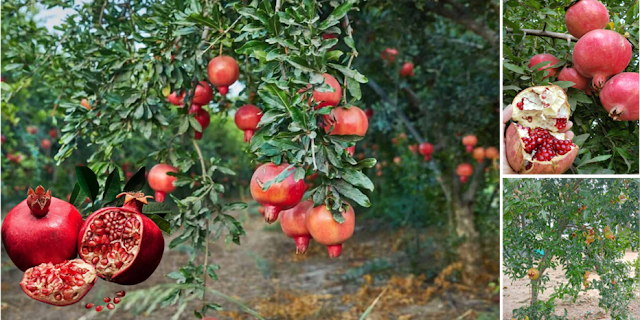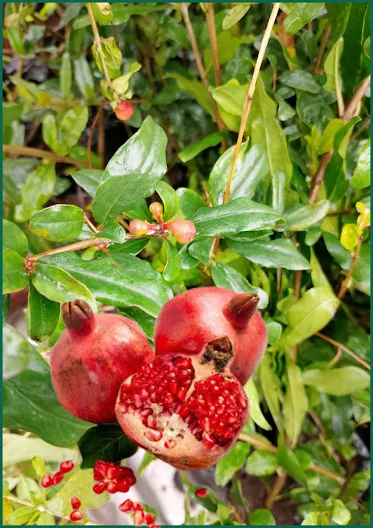Kenya's rapidly expanding pomegranate farming industry is propelled by compelling considerations. The pomegranate, also known as Punica granatum, has grown in popularity in recent years as consumers seek climate-resilient crops and superfoods. This is due to its excellent health benefits and suitability for semi-arid environments. Farmers and agricultural entrepreneurs in Kenya, Uganda, Tanzania, and other countries are starting to look into the enormous potential of this vivid red fruit.
 |
| Pomegranate farming in Kenya: A rising trend in agribusiness |
Pomegranates are highly sought after in a range of industries, including cosmetics and beauty goods, fresh juice, and herbal supplements, due to their high level of vitamin C, potassium, fibre, and potent antioxidants known as polyphenols. The crop has not only high nutritional value, but also excellent agronomic qualities. Its deeply entrenched structure makes it drought resistant; it thrives in hot, arid environments and requires minimal maintenance once established. These characteristics make it especially suitable for some of Kenya's semi-arid climate, where a shortage of water typically makes traditional crops less viable.
7 Drought-Tolerant Fruit Trees That Can Thrive in Arid and Semi-Arid Weather
Why is Pomegranate farming in Kenya growing so fast?
The global pomegranate market is developing, particularly in the Middle East, Europe, and some Asian countries where fresh fruits and value-added goods are in high demand. Taking advantage of this growing interest provides an excellent opportunity for East African farmers to diversify their revenue streams and participate in export value chains.
Climatic requirements for pomegranate farming
Pomegranates grow well in loamy soils with a pH range of 5.5 to 7.0 and good drainage. Water-soaked soils should be avoided since they promote root disease. The crop thrives in hot, dry conditions with temperatures ranging from 25 to 35 degrees Celsius.
In Kenya, pomegranates perform well in areas that experience warm to hot climates such as such as Machakos, Makueni, Kitui, North-eastern Kenya, warmer parts of Rift Valley such as Laikipia, parts of Central Kenya such as Nyeri, the coastal region, and most parts of Western Kenya. However, some farmers in the cooler Kikuyu and Banana areas are also successfully growing it. This resilience allows farmers to take advantage of favourable weather conditions and ensure a stable supply of pomegranates throughout the year.
Fruit Farming: Climate-Smart Approach to Fruit Farming For Beginners
Land Preparation And Planting
To prepare the ground, totally clear and dig planting holes that are about two feet square. Add broken down compost or manure to increase soil quality.
Pomegranates can be grown from seeds, but vegetative reproduction—using hardwood cuttings or grafted seedlings—is more frequent. This approach allows for faster fruiting while maintaining uniformity and quality. Trees should be spaced 2m by 3m apart for adequate light, airflow, and agricultural activities.
 |
| Pomegranate seedlings for sale at Richfarm Kenya |
Planting should commence during the wet season to assist reduce the amount of initial irrigation necessary. Using organic mulch helps to maintain a temperature around the roots, keeps the soil moist, and prevents weed growth once the plant is established.
 |
| Pomegranate farming in Embu |
Unlocking Exponential Profits: Export Requirements for Fruit and Vegetable Farmers in Kenya
Cultural practices in pomegranate farming
Though they live in dry areas, young pomegranate trees benefit greatly from frequent irrigation, particularly during droughts. Drip irrigation is the most efficient technique because it uses less water and reduces the danger of fungal infections. To maximize the amount of sunlight that can travel through the canopy and the circulation of air, an annual pruning should be performed to remove ill or dead branches and shape the canopy. Furthermore, effective trimming increases the taste of the fruit and makes it easier to choose.
Fertilization is also essential for high yields. During the first two years of life, each tree should receive approximately 100 grammes of balanced NPK fertilizer. Mature trees may require up to one kilograms of fertilizer throughout the flowering and fruit-setting seasons, which should be applied twice. Annually, a constant application of organic manure as a supplement helps to maintain soil structure and fertility.
Pest And Diseases
Pomegranates, while somewhat resistant to infestation, are not immune to diseases or pests. Typical attackers include fruit borers, mealybugs, and aphids. Leaf spot, fruit rot, and root rot are the most common infections that harm plants. The most successful technique is preventative actions, thus it is critical to build habits such as sufficient spacing, adequate hygiene, and frequent monitoring. Natural therapies, such as neem-based sprays, can be used to treat minor infestations without harming the environment or beneficial insects.
Harvesting And Market
Because fruit does not mature after being harvested, it must be carefully inspected to be collected at its peak. A pomegranate is suitable for ingestion if it has a rich, deep colouration, a slight flattening of the sides, and a woody sound when tapped.
A single acre of land may support 300 to 400 pomegranate plants with proper maintenance. By the third year, each tree will have produced twenty to thirty fruits, and as the plants mature, the number of fruits will increase to eighty or one hundred twenty. Given current market values of thirty to one hundred Kenyan shillings per fruit, gross annual income per acre might reach over a million Kenyan shillings by the fourth year. The trees are an excellent long-term investment with high returns because they can produce fruit for up to twenty years.
Marketing plays an important role in determining success. Local fruit stores, supermarkets, juice bars, and dietary supplement manufacturers all purchase fresh pomegranates. Export criteria such as organic labelling or GlobalGAP accreditation may help entrepreneurs looking to extend their business into new countries achieve better rates. Middle Eastern and European countries import fresh fruit as well as its derivatives, such as dried arils and juice concentrate.
Another strategy for increasing income is to create value. Fresh juice, molasses, dried seeds, and even cosmetics made from the fruit's peel are among the most popular pomegranate-based goods. If managed and sold correctly, these items may command high prices both domestically and internationally.
Post-Harvest Management and Value Addition in Fruits and Vegetables
Economic benefits of Pomegranate farming in Kenya
1. The demand for
pomegranates continues to rise due to their nutritional value and various
health benefits, such as being a good source of antioxidants and having
potential anti-inflammatory properties. This growing demand results in higher
market prices, making pomegranate farming profitable.
2. Pomegranates have a long
shelf life, allowing farmers to store and sell their produce throughout the
year.
3. Pomegranates are used in various industries, including food and beverage, pharmaceuticals, and cosmetics, creating additional market opportunities for farmers.
Environmental benefits of pomegranate farming in Kenya
Furthermore, pomegranate
farming contributes positively to the environment. Some of the advantages of
growing pomegranate trees are;
- Act as natural barriers against
soil erosion due to their extensive root systems. These are the fruit trees you should plant if your farm is on a steep area.
- Require fewer pesticides than
other fruit crops, lowering the risk of harmful chemicals entering the
environment. You also won't have to worry about the high cost of farming inputs.
- The deep red flowers of
pomegranate trees attract pollinators, benefiting other nearby crops and
wild plant species. You can also take advantage of this and set up bee hives with an assuarity of fast honey production.
- Moreover, pomegranate
farming promotes sustainable agricultural practices, as it does not
heavily rely on excessive water consumption or synthetic fertilizers.
Projected Cost and Income for 1 acre
- Cost per seedling Ksh. 250
- Seedlings per acre -330
- Spacing - 3m by 4m
- Fruit price- Ksh. 800-1000 per kg (retail)
- Yield- 12-20kgs per tree depending on age
- Pest- Pomegranate butterfly or Fruit borer, caterpillar
- Diseases- Bacterial leaf spot, fruit cracking
- Lifespan- 20 yrs plus
To get more information and high quality seedlings for your pomegranate farming project in Kenya, contact Richfarm Kenya on 0724698357 / 0723213602.






No comments:
Post a Comment